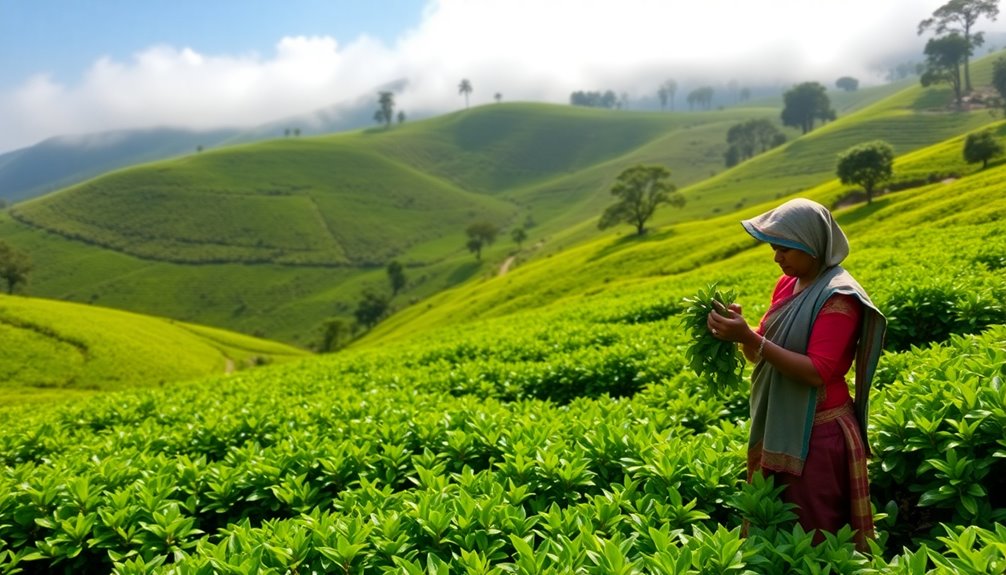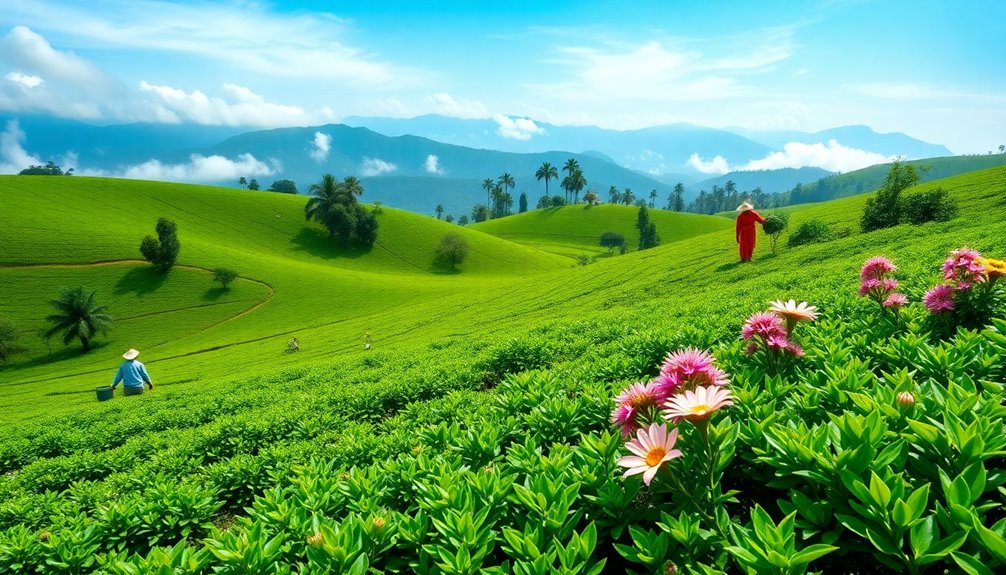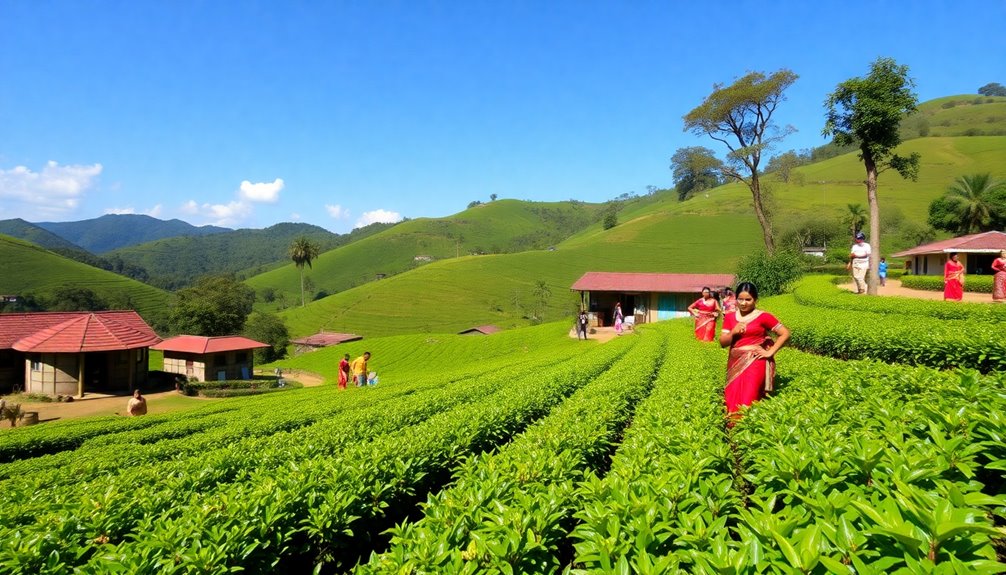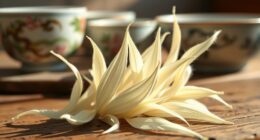When you visit Sri Lanka, don't miss the chance to enjoy these fantastic tea experiences! Start at the lush tea estates, where you can explore over 2,000 beautiful plantations. Join a guided tour at places like Mackwoods Labookellie or Pedro Tea Estate. You'll learn how tea goes from leaf to cup and enjoy tastings that burst with flavor. Be sure to visit Lipton's Seat for stunning views perfect for family photos! Sample different types of Ceylon tea and savor delicious local snacks. Excitement awaits in every sip, and there's much more to discover about this enchanting journey!
Key Takeaways
- Explore guided tours at Mackwoods Labookellie and Pedro Tea Estate to learn the tea-making process from leaf to cup.
- Visit Lipton's Seat for stunning panoramic views of lush tea plantations, perfect for photography enthusiasts.
- Enjoy delightful tea tastings amid scenic landscapes, sampling a variety of Ceylon black, green, and white teas.
- Discover the rich colonial history of tea cultivation in regions like Nuwara Eliya and Kandy, known for high-quality Ceylon tea.
- Engage with the local tea community and support ethical sourcing practices for better labor rights in the industry.
Introduction
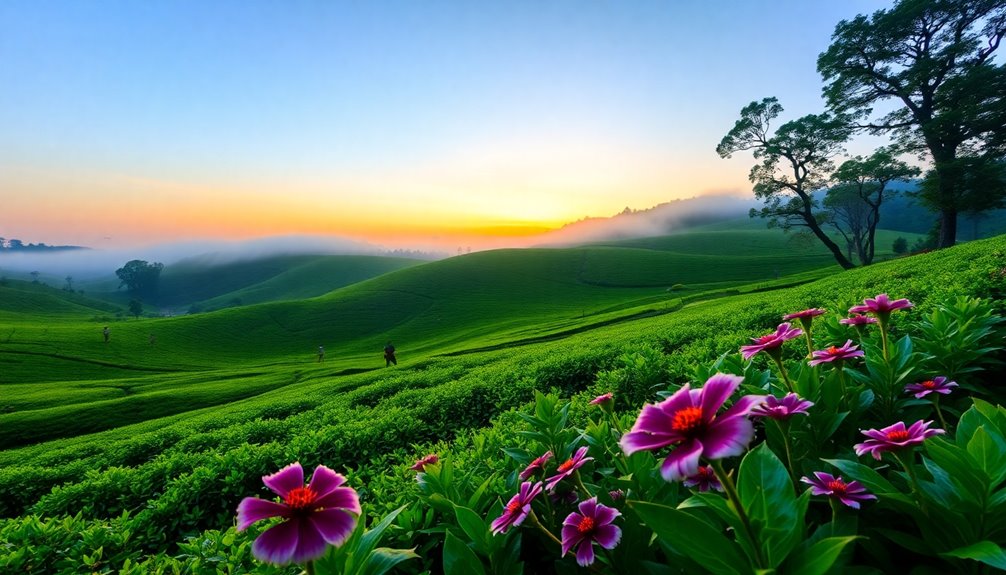
Sri Lanka's verdant hills, dotted with vibrant tea bushes, invite you to explore its rich tea heritage. As you wander through the beautiful highlands of Nuwara Eliya, you'll discover why this island is known as the "Tea Capital."
With over 2,000 tea estates, you can learn about the famous Ceylon tea that's loved all over the world. You won't want to miss the guided tours at popular spots like Mackwoods Labookellie and Pedro Tea Estate.
Here, you can dive into the tea-making process, from leaf to cup, and even enjoy delightful tastings. Imagine sipping fresh tea surrounded by lush green fields!
Don't forget to visit Lipton's Seat, where breathtaking views await you. It's a perfect spot for photos and family memories.
You can also engage with local tea pickers and watch traditional tea-making demonstrations. This experience adds a special touch to your adventure, making it feel more like a journey through time.
Tea Cultivation's Colonial Legacy

The story of tea in Sri Lanka is deeply intertwined with its colonial past. During the colonial period in the 19th century, the British introduced tea cultivation, and the first tea plants arrived in 1824.
You can feel the history as you explore the beautiful tea plantations in Nuwara Eliya and Kandy. These regions, with their high elevations of 2,000 to 7,000 feet, create the perfect environment for growing Ceylon tea, which is famous for its unique flavors.
James Taylor, a Scottish planter, played a crucial role in turning Sri Lanka into a top tea producer. Thanks to his hard work, Sri Lanka produces over 300,000 metric tons of tea every year, making it one of the leading tea exporters in the world!
When you sip on a cup of Ceylon tea, you're tasting a piece of history, enriched by the land's colonial legacy.
Tea Estates Cover 200,000 Acres
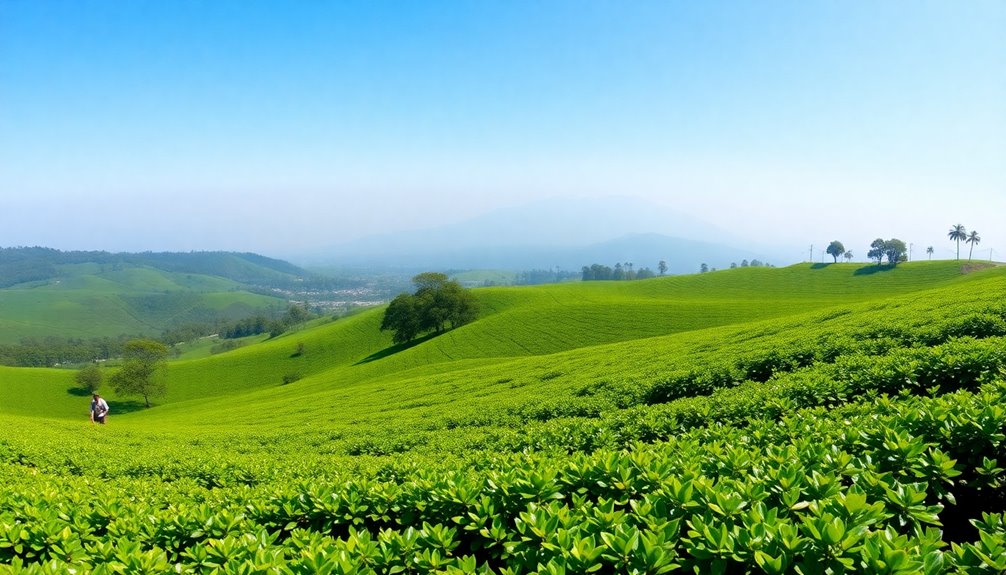
Covering approximately 200,000 acres, the tea estates of Sri Lanka create a lush tapestry across the central and southern highlands. These beautiful tea plantations are located in famous regions like Nuwara Eliya, Kandy, and Ella, where you'll find stunning landscapes that take your breath away.
The cool elevations, ranging from 2,000 to 7,000 feet, make it perfect for high-quality tea production. As you explore these tea estates, you'll see how tea cultivation began in the 19th century, thanks to British colonists.
Today, there are over 2,000 tea estates that proudly contribute to the global reputation of Ceylon tea. You can witness the entire tea-making process, from plucking the leaves to tasting the final product.
The scenic beauty of these areas is a feast for the eyes, with rolling hills and vibrant green fields. You can even enjoy a cup of freshly brewed tea while surrounded by the sounds of nature.
Tea Varieties: A Flavor Journey

Exploring the tea estates of Sri Lanka introduces you to a remarkable flavor journey filled with diverse tea varieties. You'll discover the famous Ceylon black tea, known for its bright flavor and brisk character. But that's just the beginning!
Here are some tea varieties you can enjoy:
- Specialty Teas: Try green, white, and flavored teas, each with unique taste profiles influenced by where they're grown.
- High-Grown Teas: Regions like Nuwara Eliya and Uva produce delicate teas with aromatic qualities that are sure to delight your senses.
When you visit, don't miss the traditional tea tasting experiences. You'll sample different varieties, savoring their distinct characteristics alongside delicious local snacks. Each sip reveals a new flavor profile, making every visit an exciting adventure!
As you explore, remember that each tea's taste is shaped by its region, whether it's the rich Kandy or the scenic Dimbulla.
Embrace the joy of tasting these delightful brews, and let the flavors of Sri Lanka create lasting memories for you and your family!
Labor Rights and Working Conditions
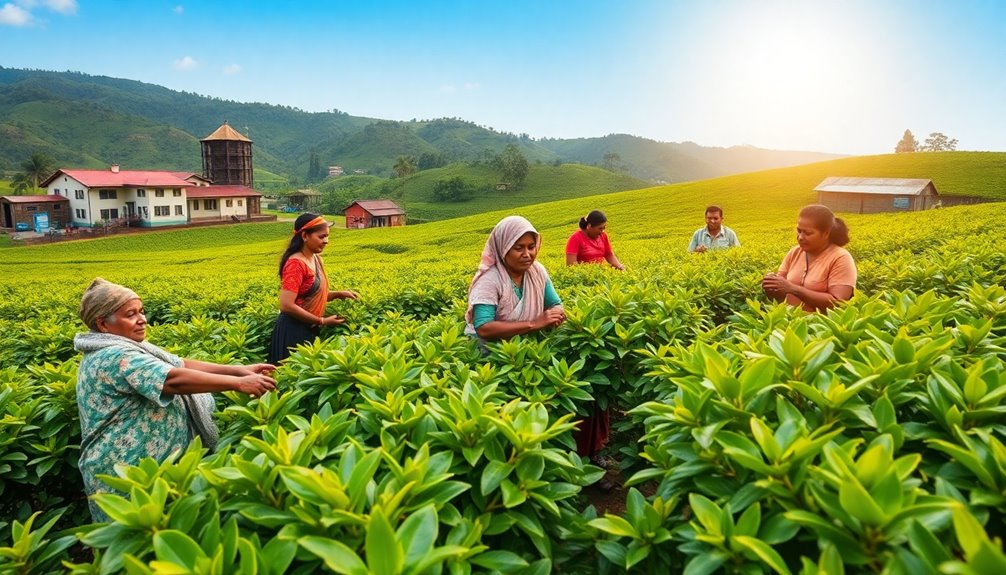
Labor rights and working conditions in Sri Lanka's tea industry are critical issues that affect the lives of around 1 million workers. Most of these tea plantation workers are women, who face job insecurity and struggle with fair compensation. They earn about Rs 700-800 per day, which raises concerns about their living conditions. Many live in plantation line houses that often lack proper facilities and services.
Efforts are underway to improve labor rights in the tea industry. Organizations are advocating for better wages and working conditions, striving to ensure that everyone has access to education and health care services. These advancements are essential, especially for women workers, who play a vital role in the industry.
Some tea estates have adopted ethical sourcing practices, showing a commitment to sustainable labor rights. This means they prioritize fair treatment for workers and work towards improving their lives.
Practical Applications
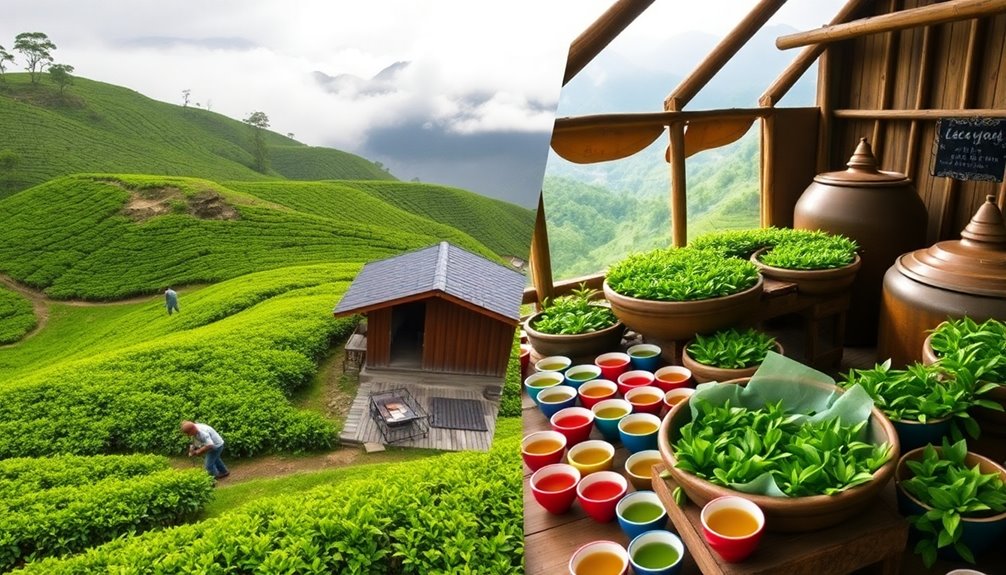
When you visit Sri Lanka's tea country, there are plenty of practical applications to enhance your experience. Start your adventure in Nuwara Eliya, where you can explore the beautiful tea estates like Bluefield Tea Gardens and Damro Labookellie Tea Factory. Both offer free entry and stunning views of the lush plantations.
Here are some tips to make the most of your visit:
- Engage in Hands-On Experiences: Try tea picking at Bluefield. It's a fun way to learn about traditional tea cultivation!
- Take Scenic Train Rides: Enjoy breathtaking views on the train ride between Kandy and Ella. It's one of the most picturesque routes in the world.
- Stay for Two Nights: Spend at least two nights in Nuwara Eliya to soak in local attractions, like Ramboda Falls.
- Join Guided Tours: Don't miss guided tours and tea tastings at Mackwoods Labookellie Tea Factory for a deeper understanding of tea.
For a perfect experience, plan early morning visits to the tea estates. You'll enjoy fewer crowds and beautiful lighting, making your trip truly special!
Frequently Asked Questions
What Is Special About Sri Lankan Tea?
Sri Lankan tea stands out for its exceptional quality and diverse flavors, thanks to unique climates and elevations. You'll appreciate the meticulous hand-picking process, which ensures only the finest leaves make it to your cup.
Which Is the Best Tea in Sri Lanka?
You'll find that Ceylon tea is the best in Sri Lanka. Its unique flavors come from the island's ideal climate and elevation, with black, green, and white varieties offering something delightful for every tea lover.
Is Green Tea From Sri Lanka Safe?
Yes, Sri Lankan green tea is safe. It's produced under strict regulations, ensuring minimal pesticide use. Many estates are certified organic, and regular testing guarantees high quality, making it a healthy choice for tea lovers like you.
Which Tea Plantation to Visit Sri Lanka?
When choosing a tea plantation in Sri Lanka, consider Bluefield for easy access, Damro for its authentic factory experience, or Pedro for guided tours. For stunning views, Lipton's Seat is perfect, and Heritance offers luxurious stays.
Conclusion
So, when you visit Sri Lanka, don't forget to dive into the world of tea! You'll love exploring lush tea estates, tasting different flavors, and learning about the fascinating history behind it all. Plus, it's a great chance to support the hardworking people who bring this delicious drink to your cup. Whether you're sipping a hot cup or enjoying a scenic tour, these tea experiences will surely make your trip unforgettable! Happy tea adventuring!

